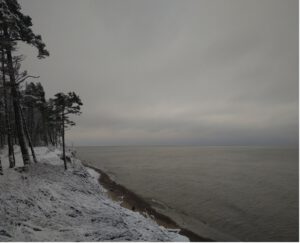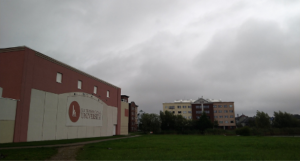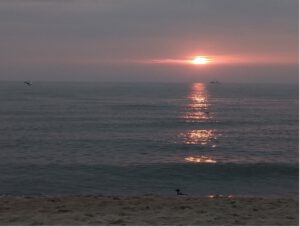
Last fall, I had the privilege of spending a semester abroad. What better place to go for a North American Studies Profile graduate than across the pond?
Even if said pond happens to be the Baltic Sea rather than the Atlantic Ocean, my journey did take me to the “North American University in the Heart of Europe”, i.e., the Republic of Lithuania. And if you’re asking yourself: “What is it doing there?” or perhaps even: “What were you doing there?” let me introduce you to this one-of-a-kind place called LCC International University.
LCC is situated in Klaipėda, the third-largest city in this small country of 2.8 million people and is home to its major seaport. From Germany and other countries bordering the Baltic Sea, you can get there directly by ferry. This is an exciting way to travel to a fairly unconventional destination.
The university, too, is anything but the first thing younger me would have pictured for my semester abroad. First off, it’s tiny. There are only a couple of hundred students enrolled for both the B.A. and M.A. programs.

Secondly, LCC is a Christian university. In fact, LCC stands for “Lithuanian Christian College.” I was looking for a semester of cultural exchange, and I can confidently say: “I found it.” Never before have I been in an academic and private environment in which religion was as present as right here. I’m just as skeptical of religion as before – specifically in combination with education – but now my criticism is based on a new set of experiences.
Shockingly, the most challenging experiences usually are the ones that teach us the most. Nothing would be further from my mind than to uncritically promote the incredibly privileged ‘the-world-is-my-oyster’ lifestyle many (Western) European students have access to. Still, for lack of a more creative phrase, I definitely grew as a person that semester. Not despite, but because of the limited space in my 5‑person dorm room.
A big contributor to that experience is the second segment of LCC’s name. The moniker “international” has truly earned its place here. Apart from the vast majority of classes taught in English, the connection to North America is definitely noticeable in teaching staff. Also, there are quite a few American students on campus as well as many mostly permanent, international students. I lived and went to class with people from Ukraine, Honduras, Russia, Lithuania, Georgia, Armenia, Latvia, Kazachstan, Afghanistan, Kirgistan, Sudan, India, Nigeria….

For many Germans, whatever lies east of the Polish-German border is a big blank when it comes to historical and cultural awareness. I would have presumed that most Americans are even less likely to seek out this part of the world, especially for education purposes. So much for presumptions.
The concept of LCC is obvious and in actuality another case of asserting the hegemonic power of the Global North and Western hemisphere. It does, however, also provide an exceptionally and unconventionally diverse setting for anyone who’s willing to open their mind and to engage with topics, people, and realities that don’t just affirm their own experiences. By choosing this excitingly unknown option for my semester abroad, I discovered a place that extends toward horizons – far beyond what I had imagined.
8,474 Total Views, 2 Views Today






